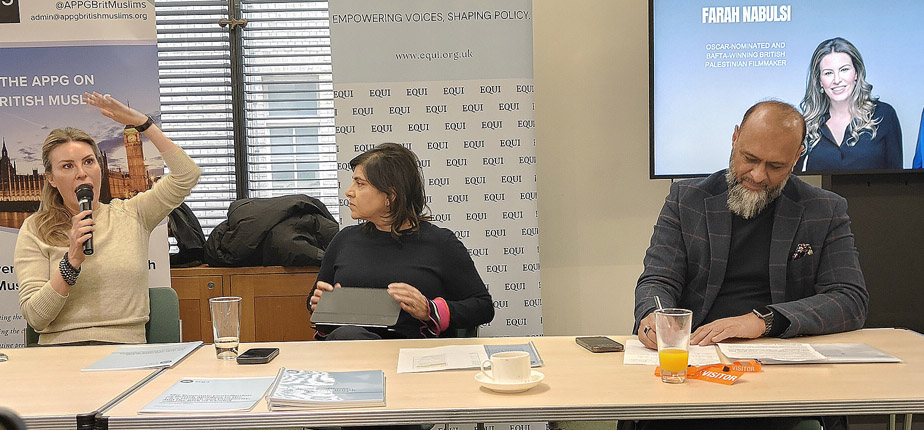
Home Correspondent
British Muslim creatives are increasingly being steered into counter-extremism-related funding streams that restrict their artistic freedom, warns a major report by a newly established think tank. The report also highlights the vital role of British Muslims as cultural producers.
Launched by Equi, a think tank, the report was unveiled in Parliament on February 12 at an event hosted by the All-Party Parliamentary Group (APPG) on British Muslims. Speakers included Labour MPs Sarah Owen and Afzal Khan, as well as former Conservative Party Chair, Baroness Sayeeda Warsi.
Sarah Owen stated that the Equi report “points out and highlights that British Muslims are transitioning from cultural consumers to cultural producers. Muslims have always been cultural producers—it’s about whether they’ve been recognized as such.”
Owen expressed concern that Muslim artists are “directed towards funding linked to counter-extremism rather than being supported for their artistic merit. We need to change that dialogue.” She added, “British Muslim artists are repeatedly labeled as ‘emerging,’ even when they are well-established.”
Equi’s Managing Director, Professor Javed Khan, addressed parliamentarians and civil society figures at the launch, noting that the think tank is “seeing engagement” from the Labour government, including ministers and special advisers. However, he stressed that Equi is “essentially about capturing British Muslim insights, learning from them, and translating them into public policy recommendations that benefit everyone—making Britain more prosperous, successful, sustainable, and socially cohesive.”
He added, “Equi’s foundation is clear: producing high-quality reports isn’t enough. We want to publish recommendations and actively work to influence those in and around government to drive meaningful change.”
Authored by Dr. Muhammad Gulbar Khan, the report highlights the growing shift of British Muslims from “cultural consumers to cultural producers,” particularly in a global market where the halal food and Muslim lifestyle sector is valued at $3.7 trillion (£2.9 trillion). It argues that the British Muslim cultural sector brings unique influences, connections, and historical perspectives, bridging different parts of the world.
In the report’s foreword, legendary musician Yusuf Islam (formerly Cat Stevens) warns that Muslim cultural activities face significant funding cuts, threatening the survival of key arts institutions. One of the report’s most striking findings is the concern that Muslim creatives are often funneled into funding linked to the Prevent counter-extremism program—a policy long criticized for disproportionately targeting Muslim communities. The report warns: “Artists who receive Prevent funding often feel uncertain about the limits imposed on their creative expression.”
It calls on the government to repurpose funding to eliminate negative perceptions, establish a working group to support Muslim creatives, and ensure they can “exercise their artistic freedom without fear of censure.”
The event featured BAFTA-winning British-Palestinian filmmaker Farah Nabulsi, who screened trailers for her films The Teacher and The Present, both set in the occupied West Bank. Despite The Teacher (2023) receiving multiple international awards, Nabulsi revealed that she struggled to find a British distributor, with some expressing concern over potential backlash.
Equi’s Professor Khan echoed this sentiment, celebrating the strong turnout of parliamentarians, community leaders, and stakeholders at the event. “Our groundbreaking report highlights a critical reality: arts and culture should not be an afterthought. They are fundamental to winning hearts and minds.” He emphasised that supporting British Muslim artists is about more than representation—it’s about unlocking talent, innovation, and economic growth that strengthens the UK as a whole.
Photo: Farah Nabulsi, Oscar-nominated and BAFTA-winning British-Palestinian filmmaker, alongside former Conservative Party Chair Baroness Sayeeda Warsi and Equi Managing Director Professor Javed Khan. (Credit: Ahmed J Versi/The Muslim News)
Additional reporting by Ahmed J Versi